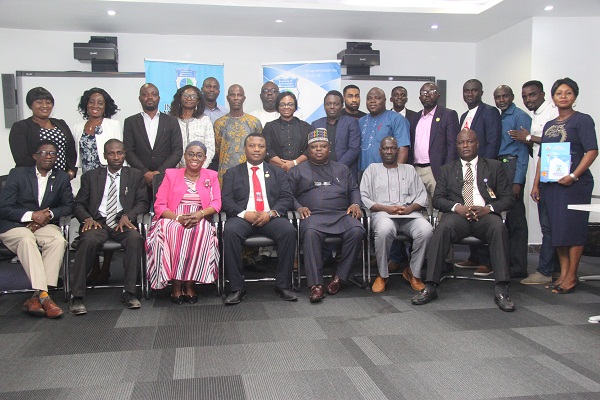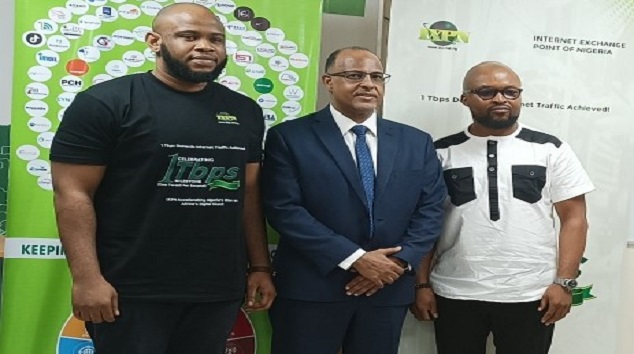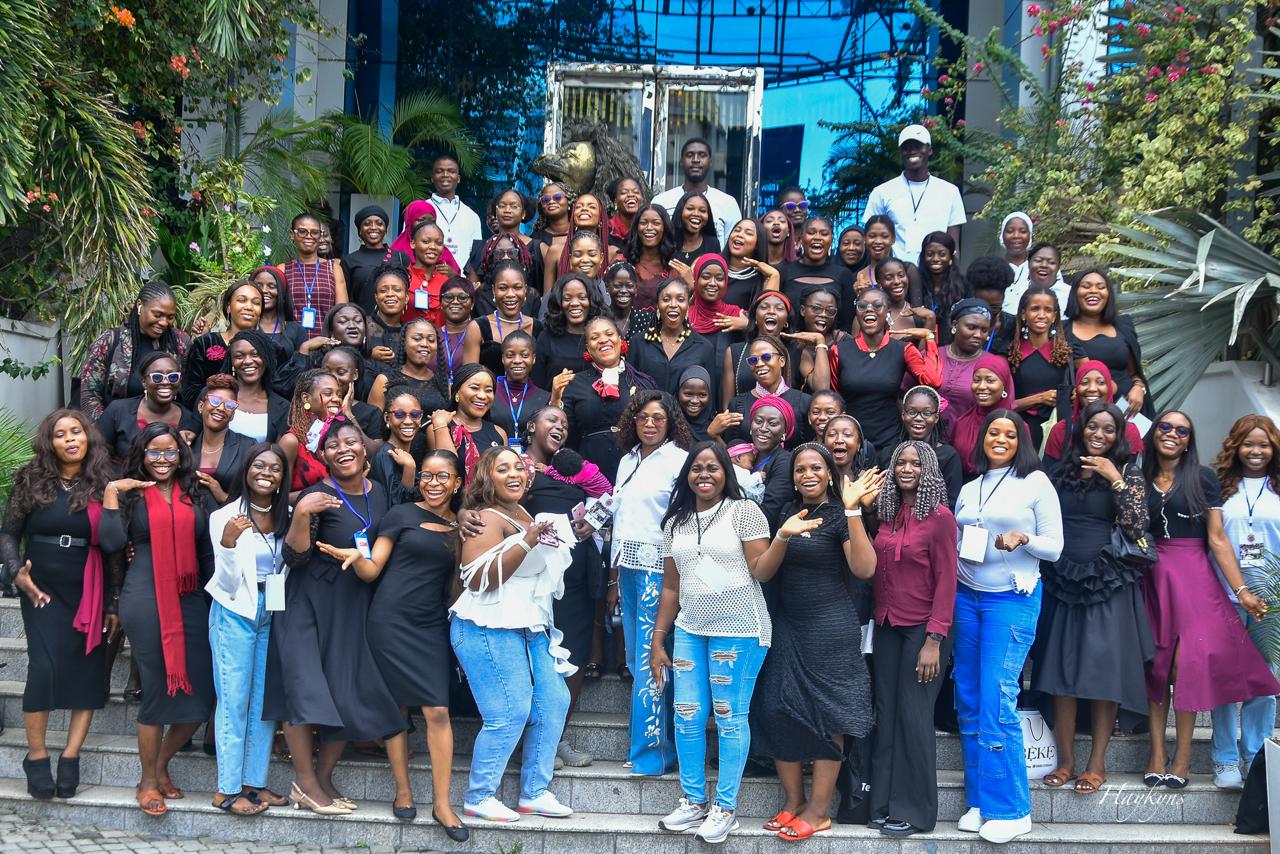Telecom
Experts at IIM Africa Information literacy week harp on proper data management

Information and data management experts have called on government at all levels to initiate policies and measures to ensure proper management of information and data in the country.
The experts gave the advice at an event organised by the Institute of Information Management (IIM Africa) to mark the Information Management and Literacy Week 2019 in Lagos.
The theme of the event was: “A reformed and renewed society through information Literacy”.
The Information Management and Literacy Week were convened to provide several opportunities in finding out about a wide range of services that information management offers.
The 2019 edition highlighted and identified various information gaps, information management needs, and also proffered required framework for effective data/information governance in regulatory agencies across the Country.

IIM Africa members on walk-out exercise
The literacy week also set the parameters for data/information management, usage, creating processes for resolving data/information issues aimed at enabling regulatory bodies and other stakeholders make decisions based on high-quality data and well-managed information assets.
Several speakers and activities lined up for the week-long programe also pin-pointed the vital role which information management services play for research and education.
Speaking at the event, Dr Oyedokun Oyewole, President, Institute of Information Management (IIM), Africa, said that government had a role to play in ensuring the existence of enabling laws, and providing adequate enlightenment to citizens on the need for proper data and information management.
Oyewole said that government could educate citizens by organising workshops, seminars and radio shows in form of jingles that would enlighten citizens on dangers involved when data and information are not properly managed.
”In other climes like America, dissemination of information by journalist is handled ethically and responsibly considering the sensitivity of such information to national security and its importance.
Simply because there are known and established principles, standards, procedures, systems and policies in place to effectively handle such. Such principles, guidelines and policies should also be encouraged and promoted in the African society for balanced reporting by journalists,” Dr. Oyewole said.
He urged government regulatory agencies and private organisations to implement/imbibe policies, laws, systems and best practices that would enhance proper management of data and information.

Launch of IUIM and RIMA founder’s Day award
Emphasising on Information governance (IG) being the overall management of the availability, usability, integrity and security of information used in an organisation.
And the need for regulatory authorities in Nigeria to ensure sound information governance program within their individual agencies with good governing body, charged with defining the set of procedures and plans to execute those procedures.
As Information Governance is required to ensure that organization’s information assets are formally, properly, proactively and efficiently managed throughout the enterprise to secure its trust & accountability, for the ultimate improvement in productivity and efficiency of an organization in meeting regulatory, legal, risk and operational requirements.
The president also commended the National Information Technology Development Agency (NITDA) for recent introduction of data privacy regulations to protect Nigerians and also sensitize them on the need to protect their personal data and information.
In a presentation titled, ‘Best Practices and the Role of the Press in Disseminating Sensitive Information to the Public’,John Montana, a renowned Information Management Expert, said that press occupy a conspicuous position to influence proper information dissemination.
“Our liberty depends on the freedom of the press, and cannot be limited without being lost”, he quoted former US President Thomas Jefferson.
He further quoted Hugo Black who said, “The Government’s power to censor the press was abolished so that the press would remain forever free to censure the Government.
“The press was protected so that it could bare the secrets of the government and inform the people.
“Only a free and unrestrained press can effectively expose the deceptions in government”.
Montana added that the role of the press is to keep the government in power in check, but must be done in accurate and objective manner.
He further cautioned against ‘careless’ reportage of sensitive information such as personal information – financial data, health data, etc; embarrassing information about a crime victim – for example rape; information that may be valuable to criminals, terrorists and other bad actors.
On his part, the Executive Director, Numeric Technologies, Mr Alexander Anago, said that there was need for the government to put in place information protection life cycle strategy to effectively protect, detect, respond and monitor hackers.
“The government needs to provide national gateway for information processing transmission to improve intelligence.
“The government should also implement cross border information security policies, cyber law and information processing policies for proper management of data.
“To effectively manage the data of citizens and the country as a whole the government needs to find a lasting solution to Advanced Persistent Threats.

Cross Section of attendees at IIm Africa Information Literacy workshop
“Advanced Persistent Threats (APT) is a network attack in which unauthorised persons gain access to a network and stay there undetected for a long period of time.
“The intention of an APT attack is to steal data; so, the government needs to adopt sophisticated techniques for early detection of such attacks before it happens,”Anago said.
He said that besides the government, the citizens also needed to stop putting all their personal information, which includes signatures, pictures of their house, cars, children and other private data on social media platform.
Anago also advised people to desist from using public WiFi as it was the easiest way for hackers to gain access to their personal details.
Dr Isa Pantami, the Director-General of NITDA, who was represented by Mr Seyi Ogunseye, a consultant in the Strategic Operations Department, said that the Agency had been creating awareness on the need for proper management of information and data.
He said that Section 6 of NITDA Act 2007 mandates the agency to create a framework for planning, research, development, monitoring, evaluation and regulation of information technology practices and systems in Nigeria.
The Information Management Literacy Week also featured important programmes like Data and Governance Forum/Exhibition; Information Management Session for schools; Novelty Football Match; Founder’s Day/RIMA Awards and official presentation of International University of Information Management (IUIM), United States.
Telecom
Nigeria Hits 1 Terabit Internet Traffic Milestone

IXPN, Nigeria’s leading Internet Exchange Point, is proud to announce a landmark achievement: crossing 1 Terabit per second (1Tbps) in aggregate peak domestic internet traffic for the first time.

This milestone signifies a major leap forward in developing Nigeria’s internet infrastructure and underscores the critical role of local internet infrastructure in driving economic growth, innovation, and connectivity for millions of Nigerians.
“This milestone is more than just a number. It’s a symbol of Nigeria’s digital maturity and our united strides towards becoming a tech-driven nation. By keeping local internet traffic within Nigeria, we reduce costs, improve speeds, and ensure our digital economy thrives with homegrown infrastructure.” said Muhammed Rudman the CEO of IXPN.
“Achieving 1 Tbps is a significant victory for Nigeria’s ICT ecosystem, a breakthrough for domestic internet traffic. It serves as a catalyst, enabling millions of Nigerians to enjoy faster, more affordable, and resilient internet connectivity.”

1 Terabit per second is a game-changer for Africa’s most populous country. To put it in perspective:
- Mega Video Calls: A speed of 1 Tbps can support over 1 million concurrent Zoom calls, allowing students, entrepreneurs, and professionals to connect and drive Nigeria’s digital revolution.
- Streaming Frenzy: With 1 Tbps, more than 200,000 people can stream HD Nollywood films or movies on Netflix simultaneously without any buffering or interruptions.
- Data Superpower: This speed enables the transfer of the entire contents of 50,000 smartphones—including photos, apps, and videos—in just one second.
For Nigeria, hitting this milestone means reducing reliance on international bandwidth, decreasing latency for local services, and strengthening our position as Africa’s digital heartbeat. This milestone is a testament to the power of collaboration, innovation, and the relentless pursuit of a faster, more connected Nigeria.
This accomplishment goes beyond technical advancements; it has significant economic implications. By encouraging local traffic exchange, IXPN reduces dependency on international bandwidth, leading to:
- Significant Cost Savings: By utilizing local data exchange, Nigerian businesses can save millions of dollars annually on international bandwidth fees.
- Enhanced Speed and Connectivity: With reduced latency, users experience smoother streaming, gaming, and real-time services, enhancing their overall online experience.
- Increased Resilience: Strengthening Nigeria’s internet infrastructure protects against global disruptions, ensuring consistent access to vital services such as healthcare and education.
- Improved Efficiency: Optimizes digital services like fintech, edtech, e-commerce, and e-health, propelling innovation and growth in these sectors.
Surveys conducted among IXPN members over the years have shown a growing percentage of local internet traffic in Nigeria. A recent report indicates that some connected members can localize or domesticate up to 70% of their internet traffic through IXPN.
“As more content providers, ISPs, banks, and public institutions localize their traffic through the IXP, end users benefit directly,” added Raphael Iloka (Marketing Manager). “We’re not just routing data — we’re building the foundation for Nigeria’s digital economy.”
The 1 Tbps peak highlights the remarkable impact of collaboration among all stakeholders. This milestone is a significant achievement not only for IXPN, but for the entire ICT ecosystem. IXPN deeply appreciates the vital contributions of all stakeholders involved.
To our Members and Partners: Your trust and participation have been essential to our growth. Together, we have established a hub where networks can interconnect, innovate, and thrive.
To the Government and Regulators: We express our sincere appreciation to the Nigerian Communications Commission (NCC) for all its support over the years and its vision of a digitally inclusive Nigeria.
To our Team: We extend our gratitude to our engineers, network administrators, and all other staff who work tirelessly behind the scenes to push boundaries.
To the Global Community: We are grateful to partner organizations like the Internet Society (ISOC). Your support and advocacy in domestic peering empower us all.
Reaching 1 Tbps is just the beginning. As data demands skyrocket with AI, IoT, 5G, and immersive technologies, IXPN is committed to staying ahead of the curve. Here’s how:
- Scaling Infrastructure: We are investing in advanced hardware and software to support multi-terabit capacities.
- Enhancing Resilience: We are strengthening our network to ensure uptime, security, and adaptability in an ever-changing digital landscape.
- Empowering Underserved Communities: We aim to expand our reach to rural areas, bridging the digital divide, and supporting agritech, edtech, and telehealth.
- Strengthening Africa’s Digital Sovereignty: Partnering with regional IXPs to keep Africa’s data on the continent.
Telecom
TD Africa’s TecHERdemy Empowers 400 Women to Lead in Tech

On April 17, 2025, the atmosphere at Yudala Heights was electric with pride, hope, and inspiration as TD Africa, the leading tech distribution company in Sub-Saharan Africa, celebrated the graduation of 400 young Nigerian women from its flagship TecHERdemy program.

Over the past six months, these incredible women immersed themselves in rigorous, hands-on training in Cybersecurity, Data Science, Artificial Intelligence, and Software Development. They are now confidently stepping into the tech world, ready to make their mark.
The event brought together top voices in the industry, including Dr. Leo Stan Ekeh, Chairman of the Zinox Group, who commended the graduates for their resilience and brilliance. In his keynote speech, he shared a hopeful vision for Africa’s future, calling these young women “the pioneers of a new, inclusive era of tech leadership on the continent.”
Mrs. Chioma Ekeh, CEO of TD Africa, also delivered a heartfelt message, urging the graduates to let their values guide them as they navigate their careers.
“Hold tightly to your values. Let integrity guide your work, let innovation fuel your dreams, and let your impact speak louder than your résumé,” she encouraged.
The ceremony was filled with emotion as graduates shared their personal stories of transformation. One of them, Yetunde Kayode, now a certified data scientist, summed it up beautifully: “This program changed my life. I’m walking away empowered, skilled, and deeply grateful to Mrs. Ekeh and the TecHERdemy team for believing in us.”
Fifteen exceptional participants were also honoured for their outstanding performance and leadership during the program, reminding everyone that excellence comes in many forms.
TecHERdemy, which launched in November 2024, was built with a simple but powerful mission: to equip young Nigerian women with globally relevant digital skills and open doors to a tech career. But what happened over those six months went beyond just skills; it sparked a movement.
This graduation wasn’t just the end of a program. It was the beginning of a brighter, more inclusive future for tech in Africa.
Telecom
MTN Nigeria Faces Class Action Lawsuit over Alleged Data Mismanagement

Nigerians have launched a class action lawsuit against MTN Nigeria, accusing the telecom giant of unexplained data usage and rapid depletion.

The controversy erupted after a viral post on X (formerly Twitter) showcased an individual’s interest in taking legal action, along with evidence of unusual data activity.
This post rallied many others to join the cause, sharing their own grievances and pledging support.
A Google Form was circulated to collect names of affected users, highlighting issues such as false data top-ups and excessive costs without value.
Comparisons to data usage and pricing in other countries only fueled the frustration, and numerous Nigerians expressed their determination to pursue justice.
Social media buzz amplified the issue, with mixed reactions ranging from encouragement to skepticism about the lawsuit’s potential impact.
Meanwhile, MTN Nigeria has not yet released an official response to these allegations.

 Telecom3 days ago
Telecom3 days agoMTN Nigeria Takes Broadband Services to the Next Level with FibreX Launch

 News3 days ago
News3 days agoSERAP Files Lawsuit Against NBC Over Ban on Eedris Abdulkareem’s Protest Song Tell Your Papa

 Telecom2 days ago
Telecom2 days agoDigital Transformation Remains Africa’s Gateway to Economic Advancement – Adumike

 Telecom2 days ago
Telecom2 days agoPAFON 2.0: Experts Discuss Pathways to Boost Financial Inclusion in Nigeria

 General News2 days ago
General News2 days agoEFCC Clarifies SCUML Certificate Misuse amid CBEX Ponzi Scheme Scandal

 E-Financial2 days ago
E-Financial2 days agoCBN, NGX Group Defend Economic Reforms at Nasdaq

 E-Financial3 days ago
E-Financial3 days agoFCMB Group Redefines Corporate Storytelling with The Power Of The Group TVC

 Telecom18 hours ago
Telecom18 hours agoMTN Nigeria Faces Class Action Lawsuit over Alleged Data Mismanagement




























